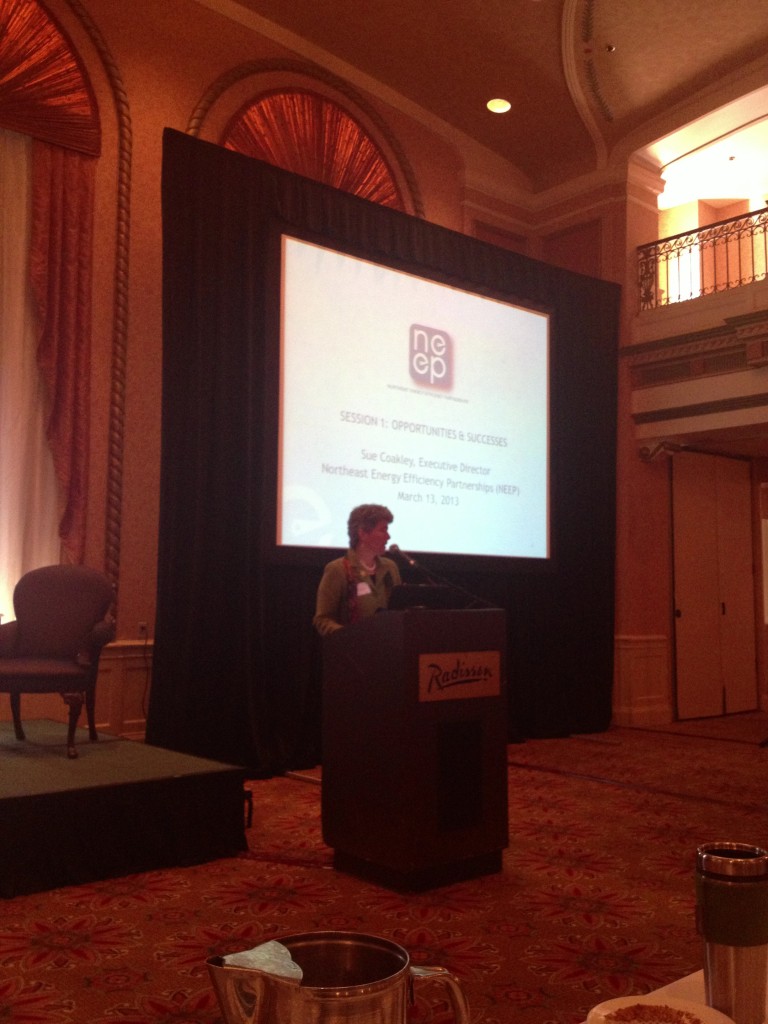By Josh Craft | Mon, March 25, 13
This edition of the Policy Tracker finds us right in the middle of legislative sessions in the Northeast states. Over the past monthly, NEEP has been engaged in a number of important policy discussions, including on the future of combined heat and power, oil heat energy efficiency programs, If you have questions or would like more information, please send a note to me at jcraft@neep.org.
Regional Industrial Energy Efficiency Dialogue
NEEP helped lead the Department of Energy’s recent Northeast/Mid-Atlantic Regional Dialogue on Industrial Energy Efficiency in Baltimore on March 12th. Policymakers, utility representatives, and academic experts discussed the potential benefits that expanded combined heat and power (CHP) capacity and barriers and policy drivers would bring. NEEP’s Sue Coakley moderated a panel to discuss successes with CHP in states throughout our region. We were pleased to have excellent speakers from Northeast Utilities, NYSERDA, National Grid, Sikorsky Aircraft, UMass Medical School, and the Rhode Island Office of Energy Resources (OER). Massachusetts Undersecretary of Energy and Environmental Affairs Barbara Kates-Garnick delivered a keynote address. For more information, see DOE’s new “Guide to the Successful Implementation of State Combined Heat and Power Policies."
 Oil Heat Energy Efficiency Legislation
NEEP has long advocated for expanded access to energy efficiency programs for residents and businesses that heat with oil, whose ability to get assistance with their energy costs is limited. Natalie Hildt, our manager of policy outreach, recently testified in favor a new bill in Connecticut, HB 6650, that would create a new fund for those customers (read her testimony here). Massachusetts lawmakers are also working to tackle oil heat efficiency this session, where supporters have introduced H 2741. While a similar effort in Vermont stalled, we are pleased to see lawmakers from across the region debating this vital energy policy issue. For more on our efforts in Massachusetts, please go the Oil Heat Save Energy coalition website.
Boston’s Building Energy Disclosure Proposal
Oil Heat Energy Efficiency Legislation
NEEP has long advocated for expanded access to energy efficiency programs for residents and businesses that heat with oil, whose ability to get assistance with their energy costs is limited. Natalie Hildt, our manager of policy outreach, recently testified in favor a new bill in Connecticut, HB 6650, that would create a new fund for those customers (read her testimony here). Massachusetts lawmakers are also working to tackle oil heat efficiency this session, where supporters have introduced H 2741. While a similar effort in Vermont stalled, we are pleased to see lawmakers from across the region debating this vital energy policy issue. For more on our efforts in Massachusetts, please go the Oil Heat Save Energy coalition website.
Boston’s Building Energy Disclosure Proposal
 NEEP’s Building Team is working in support of the new proposal by Boston Mayor Thomas Menino to create a building energy reporting and disclosure ordinance for medium and large buildings. The ordinance would require such buildings to report energy and water use, as well as greenhouse gas emissions annually, starting with city buildings and then non-residential buildings of 50,000 square feet or more in 2014. NEEP strongly believes that building energy disclosure will be a win for tenants and the real estate industry alike, which New York City, Washington, D.C., Minneapolis, Philadelphia and others are already learning. The Boston City Council will be conducting hearings on the measure (Docket #340) next Thursday, March 28 at 1pm. Please contact NEEP staff if you are interested in testifying at the hearing.
Regional Energy Efficiency Database (REED)
If you haven’t done so already, we encourage you to check out the EM&V Forum’s new Regional Energy Efficiency Database (REED) at www.neep-reed.org! This important new tool includes 2011 electric and gas energy efficiency program data for 8 states: Connecticut, Maine, Maryland, Massachusetts, New Hampshire, New York, Rhode Island and Vermont. If you would like to learn more, you can register for our next REED webinar on April 8th.
Other Legislation We’re Watching
Additionally, NEEP’s Policy team is also keeping an eye on the following important legislation moving through the state legislatures:
-Connecticut HB 6360: This bill would implement many of the recommendations in the state’s new Comprehensive Energy Strategy, which was released last month.
-Maryland HB 40: This bill would require disclosure of utility bills to purchasers of residential real property.
-New Hampshire SB 191: This bill would create a state energy planning commission for New Hampshire to examine future energy needs and policy options to address them.
-Rhode Island HB 5800: This bill would expand Rhode Island’s appliance energy efficiency standards to include electric spas and double-ended quartz halogen lamps.
NEEP’s Building Team is working in support of the new proposal by Boston Mayor Thomas Menino to create a building energy reporting and disclosure ordinance for medium and large buildings. The ordinance would require such buildings to report energy and water use, as well as greenhouse gas emissions annually, starting with city buildings and then non-residential buildings of 50,000 square feet or more in 2014. NEEP strongly believes that building energy disclosure will be a win for tenants and the real estate industry alike, which New York City, Washington, D.C., Minneapolis, Philadelphia and others are already learning. The Boston City Council will be conducting hearings on the measure (Docket #340) next Thursday, March 28 at 1pm. Please contact NEEP staff if you are interested in testifying at the hearing.
Regional Energy Efficiency Database (REED)
If you haven’t done so already, we encourage you to check out the EM&V Forum’s new Regional Energy Efficiency Database (REED) at www.neep-reed.org! This important new tool includes 2011 electric and gas energy efficiency program data for 8 states: Connecticut, Maine, Maryland, Massachusetts, New Hampshire, New York, Rhode Island and Vermont. If you would like to learn more, you can register for our next REED webinar on April 8th.
Other Legislation We’re Watching
Additionally, NEEP’s Policy team is also keeping an eye on the following important legislation moving through the state legislatures:
-Connecticut HB 6360: This bill would implement many of the recommendations in the state’s new Comprehensive Energy Strategy, which was released last month.
-Maryland HB 40: This bill would require disclosure of utility bills to purchasers of residential real property.
-New Hampshire SB 191: This bill would create a state energy planning commission for New Hampshire to examine future energy needs and policy options to address them.
-Rhode Island HB 5800: This bill would expand Rhode Island’s appliance energy efficiency standards to include electric spas and double-ended quartz halogen lamps.
 Oil Heat Energy Efficiency Legislation
NEEP has long advocated for expanded access to energy efficiency programs for residents and businesses that heat with oil, whose ability to get assistance with their energy costs is limited. Natalie Hildt, our manager of policy outreach, recently testified in favor a new bill in Connecticut, HB 6650, that would create a new fund for those customers (read her testimony here). Massachusetts lawmakers are also working to tackle oil heat efficiency this session, where supporters have introduced H 2741. While a similar effort in Vermont stalled, we are pleased to see lawmakers from across the region debating this vital energy policy issue. For more on our efforts in Massachusetts, please go the Oil Heat Save Energy coalition website.
Boston’s Building Energy Disclosure Proposal
Oil Heat Energy Efficiency Legislation
NEEP has long advocated for expanded access to energy efficiency programs for residents and businesses that heat with oil, whose ability to get assistance with their energy costs is limited. Natalie Hildt, our manager of policy outreach, recently testified in favor a new bill in Connecticut, HB 6650, that would create a new fund for those customers (read her testimony here). Massachusetts lawmakers are also working to tackle oil heat efficiency this session, where supporters have introduced H 2741. While a similar effort in Vermont stalled, we are pleased to see lawmakers from across the region debating this vital energy policy issue. For more on our efforts in Massachusetts, please go the Oil Heat Save Energy coalition website.
Boston’s Building Energy Disclosure Proposal
 NEEP’s Building Team is working in support of the new proposal by Boston Mayor Thomas Menino to create a building energy reporting and disclosure ordinance for medium and large buildings. The ordinance would require such buildings to report energy and water use, as well as greenhouse gas emissions annually, starting with city buildings and then non-residential buildings of 50,000 square feet or more in 2014. NEEP strongly believes that building energy disclosure will be a win for tenants and the real estate industry alike, which New York City, Washington, D.C., Minneapolis, Philadelphia and others are already learning. The Boston City Council will be conducting hearings on the measure (Docket #340) next Thursday, March 28 at 1pm. Please contact NEEP staff if you are interested in testifying at the hearing.
Regional Energy Efficiency Database (REED)
If you haven’t done so already, we encourage you to check out the EM&V Forum’s new Regional Energy Efficiency Database (REED) at www.neep-reed.org! This important new tool includes 2011 electric and gas energy efficiency program data for 8 states: Connecticut, Maine, Maryland, Massachusetts, New Hampshire, New York, Rhode Island and Vermont. If you would like to learn more, you can register for our next REED webinar on April 8th.
Other Legislation We’re Watching
Additionally, NEEP’s Policy team is also keeping an eye on the following important legislation moving through the state legislatures:
-Connecticut HB 6360: This bill would implement many of the recommendations in the state’s new Comprehensive Energy Strategy, which was released last month.
-Maryland HB 40: This bill would require disclosure of utility bills to purchasers of residential real property.
-New Hampshire SB 191: This bill would create a state energy planning commission for New Hampshire to examine future energy needs and policy options to address them.
-Rhode Island HB 5800: This bill would expand Rhode Island’s appliance energy efficiency standards to include electric spas and double-ended quartz halogen lamps.
NEEP’s Building Team is working in support of the new proposal by Boston Mayor Thomas Menino to create a building energy reporting and disclosure ordinance for medium and large buildings. The ordinance would require such buildings to report energy and water use, as well as greenhouse gas emissions annually, starting with city buildings and then non-residential buildings of 50,000 square feet or more in 2014. NEEP strongly believes that building energy disclosure will be a win for tenants and the real estate industry alike, which New York City, Washington, D.C., Minneapolis, Philadelphia and others are already learning. The Boston City Council will be conducting hearings on the measure (Docket #340) next Thursday, March 28 at 1pm. Please contact NEEP staff if you are interested in testifying at the hearing.
Regional Energy Efficiency Database (REED)
If you haven’t done so already, we encourage you to check out the EM&V Forum’s new Regional Energy Efficiency Database (REED) at www.neep-reed.org! This important new tool includes 2011 electric and gas energy efficiency program data for 8 states: Connecticut, Maine, Maryland, Massachusetts, New Hampshire, New York, Rhode Island and Vermont. If you would like to learn more, you can register for our next REED webinar on April 8th.
Other Legislation We’re Watching
Additionally, NEEP’s Policy team is also keeping an eye on the following important legislation moving through the state legislatures:
-Connecticut HB 6360: This bill would implement many of the recommendations in the state’s new Comprehensive Energy Strategy, which was released last month.
-Maryland HB 40: This bill would require disclosure of utility bills to purchasers of residential real property.
-New Hampshire SB 191: This bill would create a state energy planning commission for New Hampshire to examine future energy needs and policy options to address them.
-Rhode Island HB 5800: This bill would expand Rhode Island’s appliance energy efficiency standards to include electric spas and double-ended quartz halogen lamps.
